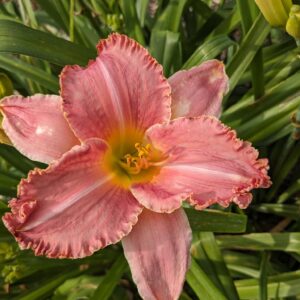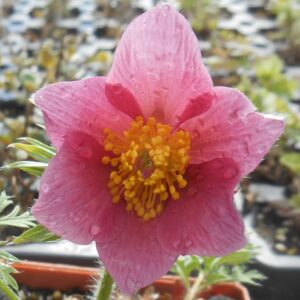Uncategorized
Showing all 4 results
-
Gaura lindheimeri syn. Oenothera lindheimeri White gaura, Beeblossom Z 5-9
Multitudes of small white/pink. 4-petaled blossoms on wiry stems from May to October. Cut back by half in July to increase blossoms, as though the hoards are not enough.
ARCHIVED
Note: This is a plant not currently for sale. This is an archive page preserved for informational use.
Multitudes of small white/pink. 4-petaled blossoms on wiry stems from May to October. Cut back by half in July to increase blossoms, as though the hoards are not enough.
Size: 36” x 36”
Care: Full sun in well-drained to moist well-drained acidic soil
Native: Texas and Louisiana
Wildlife Value: deer & rabbit resistant. Source of pollen for bees, butterflies and hummingbirds
Awards: Royal Horticultural Society Award of Merit.Gaura is from the Greek gauros meaning superb. Collected in 1851 by German plant hunter Ferdinand Lindheimer (1801-1879) in the Texas Hill Country. Lindheimer considered the Father of Texas botany. L.H. Bailey (1913) wrote: “The best kind is Gaura lindheimeri which has white flowers of singular appearance, with rosy calyx tubes.”
-
Hemerocallis ‘Coral Lemonade’ Z 4-9
Tetraploid Daylily. Rose-pink blossom, Petal edges ruffled, sepals smaller and edges mostly smooth. Small green gold colored eye. Blooms in July.
Tetraploid Daylily. Rose-pink blossom, Petal edges ruffled, sepals smaller and edges mostly smooth. Small green gold colored eye. Blooms in July.
Size: 29-36” tall; Blossoms 5” across
Care: sun in most any soilTetraploid Daylily. Rose-pink blossom, Petal edges ruffled, sepals smaller and edges mostly smooth. Small green gold colored eye. Blooms in July.
-
Pulsatilla vulgaris var. rubra syn. Anemone pulsatilla var. rubra Pasqueflower
Wine-red petals of bell-shape with yellow centers flowers in early spring. Fun, furry foliage
ARCHIVED
Note: This is a plant not currently for sale. This is an archive page preserved for informational use.
Wine-red petals of bell-shape with yellow centers flowers in early spring. Fun, furry foliage and Medusa-like seed heads.
Size: 12-20” x 4-8”
Care: sun in well-drained to moist well-drained soil
Native: Europe
Wildlife Value: Deer resistant, early pollen source for bees.Called Pasqueflower because it blooms at Easter time. Variety rubra considered a separate species, not a variety, by Caspar Bauhin in Theatri botanici, 1671. Illustrated in Gerard’s Herball, 1636.
-
Teucrium montanum Mountain germander, Creeping germander Z 5-8
Evergreen, narrow leaves covered with bouquets of flowers topped with a pair of upright, clasping petals streaked with burgundy, leading to a pair of open, white arms and a single, drooping white petal all resembling a snowman with a pointed red-streaked head blooming all summer on this spreading, cover-the-ground, drought-tolerant plant.
Evergreen, narrow leaves covered with bouquets of flowers topped with a pair of upright, clasping petals streaked with burgundy, leading to a pair of open, white arms and a single, drooping white petal all resembling a snowman with a pointed red-streaked head blooming all summer on this spreading, cover-the-ground, drought-tolerant plant.
Size: 10” x spreading
Care: sun in well-drained soil
Native: Spain across the Alps and east as far as TurkeyThe word teucrium believed to be named for Teucer, king in ancient Troy . He reputedly made medicine from teucrium. Known more than two centuries ago in ancient Greece and Rome




